 |
Prof. Alun Vaughan |
| University of Southampton, United Kingdom | |
| Alun Vaughan is Professor of Dielectric Materials and Head of the Electronics and Electrical Engineering Research Group within Electronics and Computer Science at the University of Southampton, UK. He has a background in chemical physics and polymer physics and, before moving to Southampton, spent periods at the UK’s Central Electricity Research Laboratories and as an academic at The University of Reading. His early research career involved studying the fundamentals of polymer crystallization, before applying this understanding to the design of polymers for use as dielectrics in high voltage applications. This work demonstrated how enhanced performance could result from careful control of molecular composition and processing, such that specific morphologies formed. More recently, much of Prof Vaughan’s research has focussed on the design of nanocomposite dielectric materials, with particular attention being focussed on understanding connections between the nanoparticle/matrix interface and macroscopic electrical characteristics. A strong theme of his research has concerned the effective translation of research findings into technological impact. Prof Vaughan is a former chair of The Dielectrics Group of the Institute of Physics, a Fellow of the Institute of Physics and a Fellow of the IET. | |
 |
Dr. Dipti Kakkar Thukral |
| Indian Institute of Technology, Delhi, India | |
| Dr. Dipti Kakkar Thukral is a polymer chemist from the Indian Institute of Technology, Delhi (M.Sc.(Chemistry), M.Tech.(Polymer Sc. & Technology) and holds a doctorate degree in Biomedical Sciences(IIT Delhi). She is recipient of national fellowships awarded by CSIR and IIT(GATE) and international fellowships awarded by the Science department of the French embassy in India. She was one of the eight recipients of the Sandwich fellowship from the French Embassy for science and technology in India, for carrying out research at University of Bordeaux, CNRS, France. She has worked on self-assembly of block copolymer based polymeric nanoparticles at the University of Bordeaux, France and gained expertise in block copolymer based targeted delivery. Dr. Dipti has acquired more than 15 years of experience as a research scientist in DRDO. Her current research work is focused on the design and synthesis of nanoparticulate carrier systems using polymers, lipids and metal oxides to deliver chemotherapeutic and anti-infection drugs for theranostic applications. She has authored several publications in highly acclaimed International journals and her work has also been recognized at international forums in several conferences and workshops in India and abroad. She is life member of the Society of Polymer Science, India, and the Society of Nuclear Medicine, India. | |
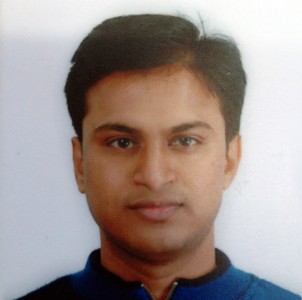 |
Dr. Falguni Pati |
| Department of Biomedical Engineering, IIT, Hyderabad, India |
|
| Dr. Falguni Pati is working as an Assistant Professor in Department of Biomedical Engineering at IIT Hyderabad. He received his ME in Biomedical Engineering from Jadavpur University, India and completed his PhD in Bioengineering from IIT Kharagpur, India. He was a Postdoctoral Fellow at Intelligent Manufacturing Systems Lab, POSTECH, South Korea from 2011 to 2014. He also worked as a Postdoctoral Fellow in the Division of Nanobiotechnology at the Royal Institute of Technology (KTH) from 2014 to 2015. His research interests include 3D bioprinting, tissue/organ models, novel bioinks, and tissue engineering. He published 15 peer reviewed journal articles and 4 book chapters. He has also applied for 2 patents with his co-workers. | |
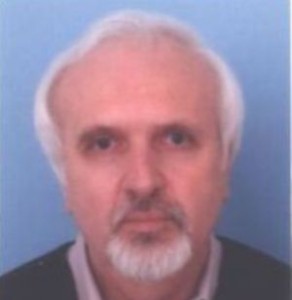 |
Jiří Spěváček, RNDr., PhD., DrSc |
| Institute of Macromolecular Chemistry, Academy of Sciences of the Czech Republic, Prague |
|
| Graduated (RNDr. and PhD.) from Charles University, Prague (1974). DrSc. (equivalent to research professor; 1990) from Czechoslovak Academy of Sciences, Prague. Senior scientist (since 1985) of the Institute of Macromolecular Chemistry, Academy of Sciences of the Czech Republic, Prague. During period 1984-2002 Head of Laboratory of spectroscopic methods, Central laboratory of solid state NMR and Department of vibrational and NMR spectroscopy of this institute. In 1998-2005 also senior scientist at Charles University, Prague. In 1979-1980 spent 1 year at Carnegie-Mellon University, Pittsburgh, USA, in 1994 spent 4 months at Université Louis Pasteur, Strasbourg, France. In scientific work engaged in studies of the structure and dynamics of polymers by NMR, also in combination with other physical methods. The author of 156 papers in scientific journals and 4 patents. According Web of Science his citation h-index = 29. Since 1986 member of the AMPERE Committee. In 2008-2014 Editor-in-Chief of The Open Macromolecules Journal. In 1991 awarded a Prize of the Czechoslovak Academy of Sciences. | |
 |
Dr. Justin L. Brown |
| The Pennsylvania State University, USA | |
| Dr. Justin L. Brown is currently an Assistant Professor of Biomedical Engineering at The Pennsylvania State University. Prior to joining the faculty at The Pennsylvania State University, Dr. Brown spent 7 years at the University of Virginia where he obtained his Ph.D. in 2008 in Biomedical Engineering and completed an NIH sponsored fellowship in Cellular and Molecular Biology. During Justin’s time at UVa he carried out research related to novel biomaterial synthesis, novel scaffold design for the regeneration of damaged or diseased bone tissue and explored the ability of substrate polarity and geometry to alter signal transduction in osteoblast progenitor cells. Dr. Brown’s research interests are on exploring the signaling cascades and phenotype progression of mesenchymal stem cells on biomaterial interfaces fabricated into novel geometries. Dr. Brown’s research blends a reductionist approach towards generating novel biomaterial geometries coupled with a high-throughput systems approach to study the cellular response to each independent scaffold parameter. Dr. Brown has acquired government funding through the NIH, industry funding through a collaboration with Titan Spine LLC., and foundation funding for his research efforts. Dr. Brown has published numerous articles on biomaterials and musculoskeletal regenerative medicine. Additionally, he has published several book chapters, the most notable being “Bone Tissue Engineering” in the 3rd Edition of Biomaterials Science: An Introduction to Materials in Medicine (Academic Press, 2013). At Penn State Dr. Brown has taught two courses required of undergraduates pursuing the Biochemical option in Biomedical Engineering, Bioengineering Transport Phenomena and Reaction Kinetics of Biological Systems. Additionally, Dr. Brown has developed a graduate course that explores current research in Regenerative Medicine. | |
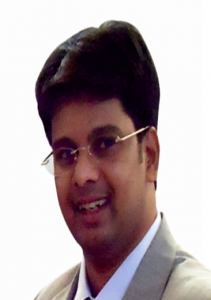 |
Dr. L. Jyothish Kumar |
| Additive Manufacturing Society of India, India | |
| Mr. Jyothish Kumar gained a Bachelor of Engineering in Mechanical Engineering from The National Institute of Engineering, Mysore and Master’s degree in Rapid Product Development from De Montfort University, UK. Currently pursuing PhD research in Aerospace Applications of Additive Manufacturing Technologies. He has specialized experience in Quality management Systems and Rapid Product Development which have been responsible in spearheading Rapitech Solutions Inc’s., efforts to streamline the business development operations for its customers. Mr. Jyothish Kumar brings credible experience and knowledge from his project work at RPMG, UK, association with other high scale (€9M) European Union funded projects with 33 other partners across Europe including Delcam Plc (UK), Materialise (Belgium) and Ducati (Italy), developing a new rapid prototyping process based on a combination of laser printing (electro photography) and Infra red sintering polymers. He has been in the industry over 14 years. | |
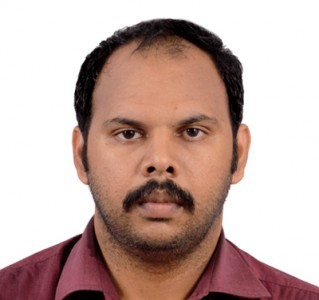 |
Dr. Jyotishkumar Parameswaranpillai |
| Cochin University of Science and Technology, India | |
| Dr Jyotishkumar Parameswaranpillai is an INSPIRE Faculty at Department of Polymer Science and Rubber Technology of Cochin University of Science and Technology (India). He received his PhD in Polymer Science and Technology (Chemistry) from Mahatma Gandhi University, Kerala, India. He has published around 45 papers in high quality international peer reviewed journals on polymer nanocomposites, polymer blends and alloys, and biopolymer, and has edited four books. Dr Jyotishkumar biographical profile is listed in the Marquis Who’s Who in the World 2015 (32 edition) in reference to the outstanding achievement in the field of Polymer Science and Technology. He also received Venus International Foundation award for the best Young Faculty (Science/Chemistry) in the country for the year 2015. | |
 |
Dr. Prasad Dasappa |
| SABIC Research & Technology Pvt. Ltd., India | |
| Prasad Dasappa is a scientist at SABIC Research and Technology Pvt. Ltd., Bangalore, India where he works in an application development team. He graduated from University of Waterloo, Canada, with a PhD in Mechanical engineering in 2008. After graduation, he worked as a postdoctoral fellow and later joined SABIC in 2010. In the past, he has worked on developing material models for composites and forming limit diagrams in Al and Mg Alloys. Prasad has more than 5 years of experience on structural analysis for various applications. Currently, he is leading a project on design for additive manufacturing. He has more than 12 publications to his credit. | |
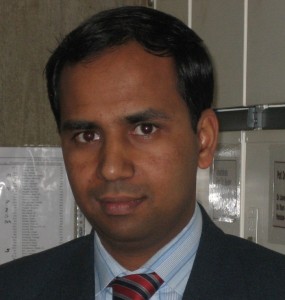 |
Dr. Samir H. Chikkali |
| CSIR – National Chemical Laboratory, India | |
| Dr. Samir Chikkali earned his Ph.D. under the supervision of Prof. Dietrich Gudat from the University of Stuttgart, Germany. Subsequently, he did postdoctoral research with Prof. Joost Reek at the University of Amsterdam, Netherlands and Prof. Stefan Mecking at the University of Konstanz, Germany. In 2012 he returned to India and joined CSIR‐National Chemical Laboratory (CSIRNCL), Pune, to start his independent research career. Currently he leads a team of highly motivated researchers in organometallics and polymers. His scientific interests are‐ functional olefin polymerization, renewables to polymers, P‐stereogenic supramolecular phosphines and cooperative catalysis. His honours and awards include fellowship from Indian Academy of Science, DFG (German Research Council) doctoral fellowship, a DPI (Dutch Polymer Institute) postdoctoral fellowship, AvH (Alexander von Humboldt) postdoctoral fellowship and the Ramanujan (DST‐India) Fellowship. He has 24 international publications to his credit, one world patent and one provisional patent. He has delivered talks around the globe (Germany, Netherlands, Austria, Poland, Belgium, UK and USA). He serves as a reviewer to major international journal (Green Chem.; Chem. Commun.; RSC Advances; Inorg. Chem.; ChemCatChem.; PCCP; J. Appl. Polym. Sci. etc) in the field. His current research is supported by five sponsored projects from government and private entities. | |
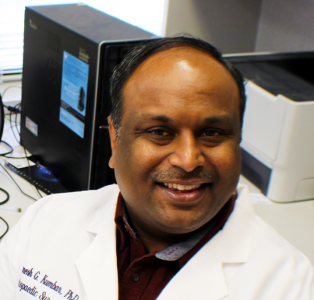 |
Dr. Sangamesh Kumbar |
| University of Connecticut, USA | |
| Dr. Kumbar is currently a tenure-track Assistant Professor with primary appointment in the Department of Orthopaedic Surgery at the University of Connecticut in Farmington, CT, USA. Dr. Kumbar is a core faculty member of the Institute for Regenerative Engineering and the Biomedical Engineering Department in the School of Engineering, with joint appointment in the Department of Materials Science and Engineering. Dr. Kumbar’s current research focuses on the synthesis, characterization and implementation of nanostructures for tissue engineering and drug delivery. Dr. Kumbar trained as a biomaterials and drug delivery scientist receiving his PhD in Chemistry from Karnatak University, Dharwad, India. He received his M.Sc. in Physical Chemistry with Spectroscopy specialization, and his B.Sc. in Physics, Chemistry and Mathematics. His doctoral thesis focused on the development of micro- particulate drug delivery systems. He began his career at the National Chemical Laboratory, India as a tenured faculty member working on polymeric biomaterials and their related characterization for drug delivery. He pursued post-doctoral training in tissue engineering at the University of Virginia and was promoted to Assistant Research Professor. He began his independent career at the University of Connecticut in 2008 addressing interdisciplinary engineering solutions to clinical problems. Dr. Kumbar’s research work and niche expertise is polysaccharide-based biomaterials and micro-nanostructured scaffolds for drug delivery and tissue engineering. Scaffolds are engineered extracellular matrix substitutes that support tissue repair and regeneration. Specifically, his independent work is in the creation of semi-synthetic cellulose and chitosan polysaccharide derivatives that display unique features of both natural and synthetic polymers. He and his team has synthesized/developed novel ionically conductive polymers, injectable polysaccharide hydrogels, long-term implantable drug delivery devices, biodegradable elastomers, and efficient methodologies to produce nanofibers from natural polymers for bone, cartilage, tendon, and neural tissue repair and regeneration. Dr. Kumbar’s bioengineering research program is supported by the federal and state funding agencies. As the principle investigator he has received multiple major research funding from the US National Science Foundation, the US Department of Defense and the Connecticut Regenerative Medicine Research Fund (Established Investigator Award). He is the author of over 60 articles in peer-review journals, has 3 under-review patent applications, and 1 issued patent. Dr. Kumbar is the corresponding author of over 14 book chapters, and given 5 invited speaker presentations at National and International professional conferences, and 7 invited faculty talks at other academic institutions. He is the co-editor of the textbook titled Natural and Synthetic Biomedical Polymers (2014) and Bio-Instructive Scaffolds for Musculoskeletal Tissue Engineering and Regenerative Medicine (2016). He serves as an Associate Editor of the Journal of Biomedical Nanotechnology and editorial board member of the Journal of Biomedical Materials Research Part B: Applied Biomaterials, Journal of Applied Polymer Science and Biomedical Physics and Engineering Express. Dr. Kumbar has an h-index of 30 which evidences the significant impact of his scientific work. |
|
 |
Dr. S. K. Nataraj |
| CSIR – Central Salt and Marine Chemicals Research Institute, India | |
| Dr. Nataraj is presently working as INSPIRE Scientist at CSIR-Central Salt and Marine Chemicals Research Institute (CSMCRI) and Assistant Professor, Academy of Scientific and Innovative Research (AcSIR), Bhavnagar, India. After completing his Ph.D on Membrane-based separation processes for effluent treatment from Karnatak University, Dharwad in 2007, he joined Chonnam National University, South Korea as postdoctoral research associate for working on Carbon Nanomaterials for Supercapacitor applications, then moved to Academia Sinica, Taipei and National Taiwan University, Taipei, Taiwan to pursue research on Fuel Cells and Energy Storage Devices. Dr. Nataraj joined Cavendish Laboratory, University of Cambridge, UK in May’2010 after successfully securing research funding from QNRF-Qatar to continue his research work on Gas and Liquid Separation Membranes. Between 2010 and 2013 he developed uniquely nanostructured block-copolymer membranes for Nanofiltration/Ultrafiltration applications. In 2013, DST, Govt of India awarded Dr. Nataraj with INSPIRE Faculty Fellowship. Since than he has been exploring new and sustainable energy materials source for Energy Generation, Conversion and Storage applications like Fuel Cells, Battery and Supercapacitors. He also been developing new materials and application in the field of energy efficient Forward Osmosis separation process. Converting vast seaweed-based biomass into Graphene, Graphene Oxide and reduced Graphene oxide and their application in Energy and Environmental applications has been resulted in filing 6 International Patents (2 Granted, 4 final submitted). So far, he authored 31 research articles, 2-review articles and 2-book chapters. Dr. Nataraj is the editorial member of 2 journals namely, Advances in Environmental Chemistry and The Scientific World Journal. He serves as Referee for more than 20 international peer reviewed journals. | |
